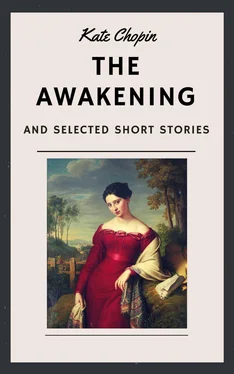The two women went away one morning to the beach together, arm in arm, under the huge white sunshade. Edna had prevailed upon Madame Ratignolle to leave the children behind, though she could not induce her to relinquish a diminutive roll of needlework, which Adele begged to be allowed to slip into the depths of her pocket. In some unaccountable way they had escaped from Robert.
The walk to the beach was no inconsiderable one, consisting as it did of a long, sandy path, upon which a sporadic and tangled growth that bordered it on either side made frequent and unexpected inroads. There were acres of yellow camomile reaching out on either hand. Further away still, vegetable gardens abounded, with frequent small plantations of orange or lemon trees intervening. The dark green clusters glistened from afar in the sun.
The women were both of goodly height, Madame Ratignolle possessing the more feminine and matronly figure. The charm of Edna Pontellier's physique stole insensibly upon you. The lines of her body were long, clean and symmetrical; it was a body which occasionally fell into splendid poses; there was no suggestion of the trim, stereotyped fashion-plate about it. A casual and indiscriminating observer, in passing, might not cast a second glance upon the figure. But with more feeling and discernment he would have recognized the noble beauty of its modeling, and the graceful severity of poise and movement, which made Edna Pontellier different from the crowd.
She wore a cool muslin that morning—white, with a waving vertical line of brown running through it; also a white linen collar and the big straw hat which she had taken from the peg outside the door. The hat rested any way on her yellow-brown hair, that waved a little, was heavy, and clung close to her head.
Madame Ratignolle, more careful of her complexion, had twined a gauze veil about her head. She wore dogskin gloves, with gauntlets that protected her wrists. She was dressed in pure white, with a fluffiness of ruffles that became her. The draperies and fluttering things which she wore suited her rich, luxuriant beauty as a greater severity of line could not have done.
There were a number of bath-houses along the beach, of rough but solid construction, built with small, protecting galleries facing the water. Each house consisted of two compartments, and each family at Lebrun's possessed a compartment for itself, fitted out with all the essential paraphernalia of the bath and whatever other conveniences the owners might desire. The two women had no intention of bathing; they had just strolled down to the beach for a walk and to be alone and near the water. The Pontellier and Ratignolle compartments adjoined one another under the same roof.
Mrs. Pontellier had brought down her key through force of habit. Unlocking the door of her bath-room she went inside, and soon emerged, bringing a rug, which she spread upon the floor of the gallery, and two huge hair pillows covered with crash, which she placed against the front of the building.
The two seated themselves there in the shade of the porch, side by side, with their backs against the pillows and their feet extended. Madame Ratignolle removed her veil, wiped her face with a rather delicate handkerchief, and fanned herself with the fan which she always carried suspended somewhere about her person by a long, narrow ribbon. Edna removed her collar and opened her dress at the throat. She took the fan from Madame Ratignolle and began to fan both herself and her companion. It was very warm, and for a while they did nothing but exchange remarks about the heat, the sun, the glare. But there was a breeze blowing, a choppy, stiff wind that whipped the water into froth. It fluttered the skirts of the two women and kept them for a while engaged in adjusting, readjusting, tucking in, securing hair-pins and hat-pins. A few persons were sporting some distance away in the water. The beach was very still of human sound at that hour. The lady in black was reading her morning devotions on the porch of a neighboring bathhouse. Two young lovers were exchanging their hearts' yearnings beneath the children's tent, which they had found unoccupied.
Edna Pontellier, casting her eyes about, had finally kept them at rest upon the sea. The day was clear and carried the gaze out as far as the blue sky went; there were a few white clouds suspended idly over the horizon. A lateen sail was visible in the direction of Cat Island, and others to the south seemed almost motionless in the far distance.
“Of whom—of what are you thinking?” asked Adele of her companion, whose countenance she had been watching with a little amused attention, arrested by the absorbed expression which seemed to have seized and fixed every feature into a statuesque repose.
“Nothing,” returned Mrs. Pontellier, with a start, adding at once: “How stupid! But it seems to me it is the reply we make instinctively to such a question. Let me see,” she went on, throwing back her head and narrowing her fine eyes till they shone like two vivid points of light. “Let me see. I was really not conscious of thinking of anything; but perhaps I can retrace my thoughts.”
“Oh! never mind!” laughed Madame Ratignolle. “I am not quite so exacting. I will let you off this time. It is really too hot to think, especially to think about thinking.”
“But for the fun of it,” persisted Edna. “First of all, the sight of the water stretching so far away, those motionless sails against the blue sky, made a delicious picture that I just wanted to sit and look at. The hot wind beating in my face made me think—without any connection that I can trace of a summer day in Kentucky, of a meadow that seemed as big as the ocean to the very little girl walking through the grass, which was higher than her waist. She threw out her arms as if swimming when she walked, beating the tall grass as one strikes out in the water. Oh, I see the connection now!”
“Where were you going that day in Kentucky, walking through the grass?”
“I don't remember now. I was just walking diagonally across a big field. My sun-bonnet obstructed the view. I could see only the stretch of green before me, and I felt as if I must walk on forever, without coming to the end of it. I don't remember whether I was frightened or pleased. I must have been entertained.
“Likely as not it was Sunday,” she laughed; “and I was running away from prayers, from the Presbyterian service, read in a spirit of gloom by my father that chills me yet to think of.”
“And have you been running away from prayers ever since, ma chere?” asked Madame Ratignolle, amused.
“No! oh, no!” Edna hastened to say. “I was a little unthinking child in those days, just following a misleading impulse without question. On the contrary, during one period of my life religion took a firm hold upon me; after I was twelve and until—until—why, I suppose until now, though I never thought much about it—just driven along by habit. But do you know,” she broke off, turning her quick eyes upon Madame Ratignolle and leaning forward a little so as to bring her face quite close to that of her companion, “sometimes I feel this summer as if I were walking through the green meadow again; idly, aimlessly, unthinking and unguided.”
Madame Ratignolle laid her hand over that of Mrs. Pontellier, which was near her. Seeing that the hand was not withdrawn, she clasped it firmly and warmly. She even stroked it a little, fondly, with the other hand, murmuring in an undertone, “Pauvre cherie.”
The action was at first a little confusing to Edna, but she soon lent herself readily to the Creole's gentle caress. She was not accustomed to an outward and spoken expression of affection, either in herself or in others. She and her younger sister, Janet, had quarreled a good deal through force of unfortunate habit. Her older sister, Margaret, was matronly and dignified, probably from having assumed matronly and housewifely responsibilities too early in life, their mother having died when they were quite young, Margaret was not effusive; she was practical. Edna had had an occasional girl friend, but whether accidentally or not, they seemed to have been all of one type—the self-contained. She never realized that the reserve of her own character had much, perhaps everything, to do with this. Her most intimate friend at school had been one of rather exceptional intellectual gifts, who wrote fine-sounding essays, which Edna admired and strove to imitate; and with her she talked and glowed over the English classics, and sometimes held religious and political controversies.
Читать дальше












